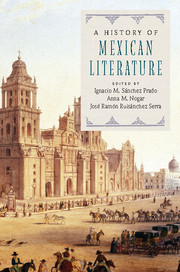Book contents
- Frontmatter
- Contents
- List of contributors
- Introduction
- PART I COLONIAL LITERATURE
- PART II THE NINETEENTH CENTURY
- 9 Early Nineteenth-Century Nation-Building Prose
- 10 The Emergence of the Mexican Literary Field (1833–1869)
- 11 The Rise of Cultural Institutions
- 12 Liberal Literat
- 13 The Conservative Paradigm
- 14 Mexican Modernismo
- PART III TWENTIETH AND TWENTY-FIRST CENTURIES
- PART IV MEXICAN LITERATURE BEYOND BOUNDARIES
- Index
- References
9 - Early Nineteenth-Century Nation-Building Prose
from PART II - THE NINETEENTH CENTURY
Published online by Cambridge University Press: 05 July 2016
- Frontmatter
- Contents
- List of contributors
- Introduction
- PART I COLONIAL LITERATURE
- PART II THE NINETEENTH CENTURY
- 9 Early Nineteenth-Century Nation-Building Prose
- 10 The Emergence of the Mexican Literary Field (1833–1869)
- 11 The Rise of Cultural Institutions
- 12 Liberal Literat
- 13 The Conservative Paradigm
- 14 Mexican Modernismo
- PART III TWENTIETH AND TWENTY-FIRST CENTURIES
- PART IV MEXICAN LITERATURE BEYOND BOUNDARIES
- Index
- References
Summary
The era from the eve of independence to the consolidation of Mexico's first federal republic was that of the birth of its newspaper industry, the first Mexican novel, public opinion, and the nation itself. The increase in narrative prose during this era was inseparable from these political strivings as expressed in periodical publications. Certain crucial themes survived independence struggles into nationhood: from before the Napoleonic invasions of 1808, Creole writers were concerned with issues of equality and emancipation, with education and erudition, and relatedly with “exemplification” – projecting their own as equal to European models of civilization. These interests would intensify throughout the early nineteenth century, a period of nation building par excellence.
The 1780 publication of Francisco Xavier Clavijero's Historia antigua de México challenged European Enlightenment authors’ “scientific” assertions of the Americas’ inferiority by defending indigenous cultures and explaining American realities using experience as opposed to conjecture. Although Clavijero (1731–1787) did not begin publishing on matters of Creole identity until his 1767 exile to Bologna, he was present in the education of New Spain's intellectual elite as an active pedagogue. Indeed, Clavijero and other Jesuit educators such as José Rafael Campoy Gastélum (1723–1777), Diego José Abad y García (1727–1779), and Francisco Xavier Alegre (1729–1788) shaped an entire generation of Creole youth through their far-reaching pedagogical labors. Creole patriotism, which theorized the existence of a nation-in-waiting in New Spanish territory prior to the arrival of the Spaniards, was characterized by deep interest in pre-Columbian indigenous civilizations and in the study of history to shape or justify nations’ behavior.
From the 1780s until the 1820s, a new generation of public intellectuals shaped nascent public opinion and developed protonational sensibilities through sustained diligence in the periodical press. They articulated their interests, molded by the previous generation's pedagogical efforts, as those of educating and increasing readership, spreading “useful” knowledge, and promoting progress and civilization. These goals were accomplished through a growing number of publications – communiqués, announcements, decrees, laws, maxims, precepts, almanac entries, estimates, letters, sermons, prayers, speeches, dialogues, and fables – issued as pamphlets, broadsheets, and periodicals that were read aloud in town squares, pulquerías (bars), barbershops, and other public spaces.
- Type
- Chapter
- Information
- A History of Mexican Literature , pp. 143 - 157Publisher: Cambridge University PressPrint publication year: 2016
References
- 2
- Cited by

